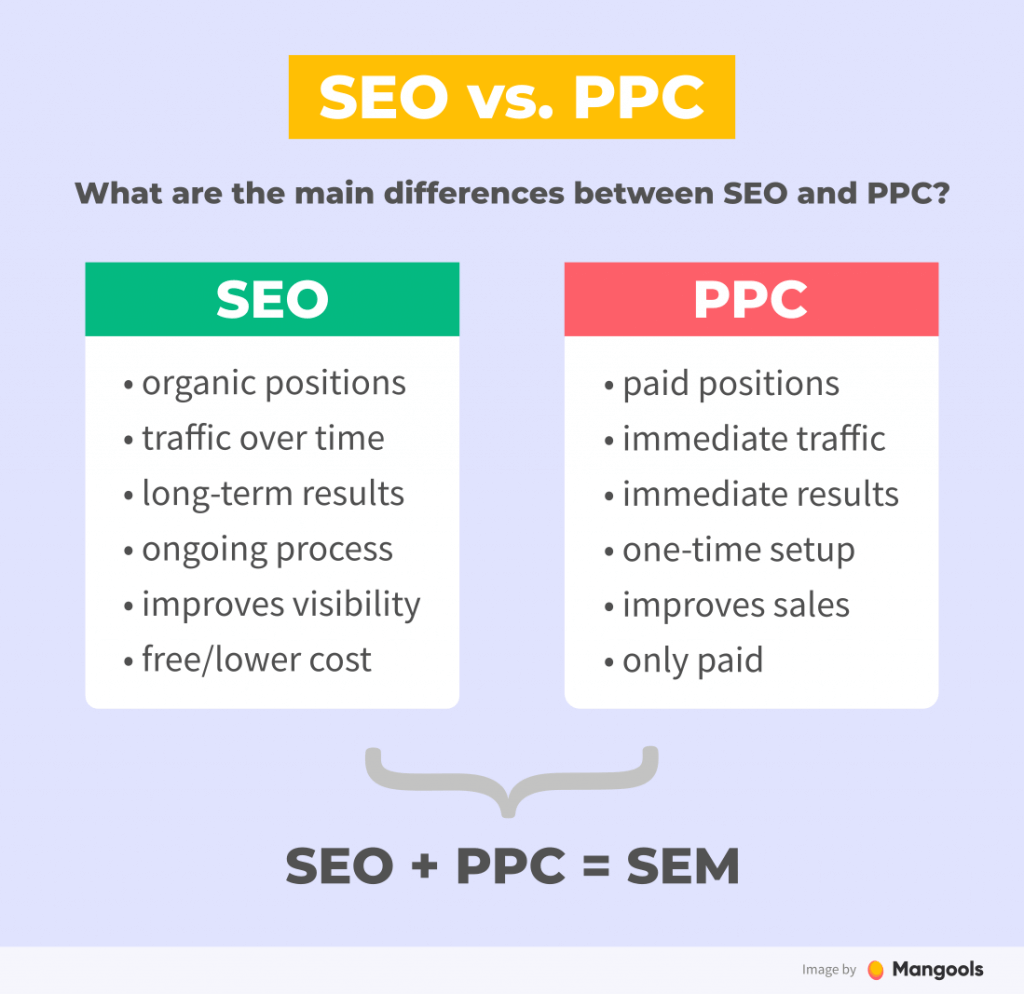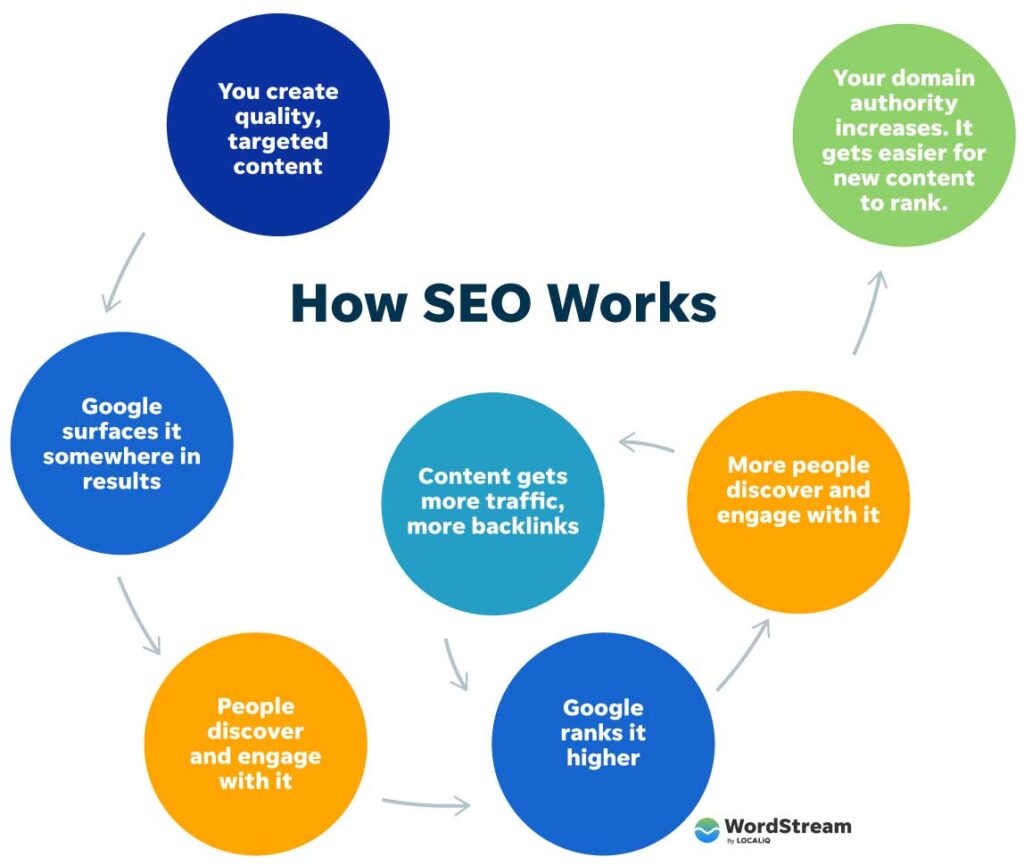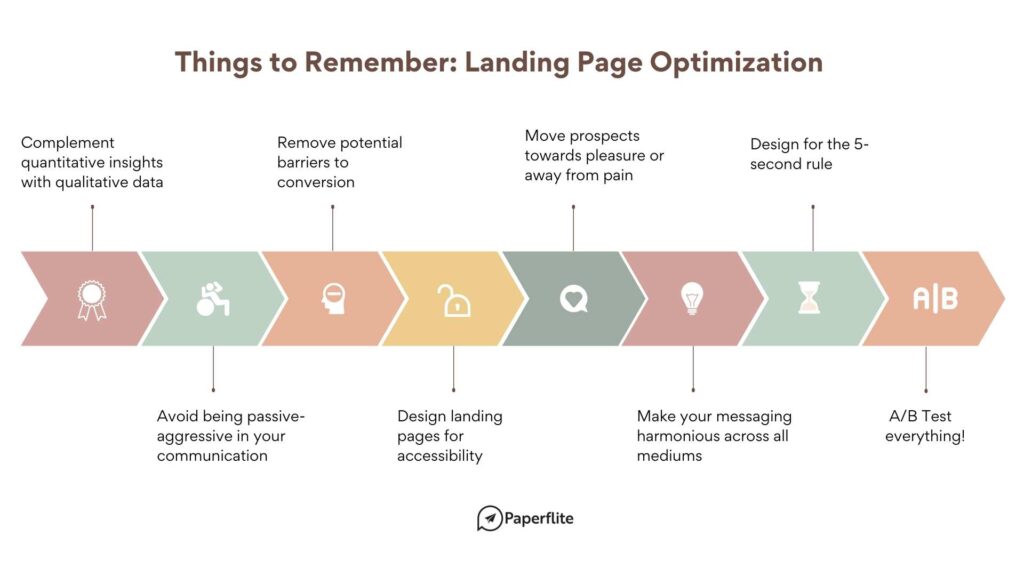Let’s explore the impact of SEO and PPC campaigns, dispel prevalent myths, and identify the true indicators of success.
The Role of SEO and PPC
There are two key strategies for driving website traffic and boosting conversions: Search Engine Optimization (SEO) and Pay-Per-Click (PPC) advertising. Understanding the role of SEO and PPC in digital marketing, how they impact online visibility, and how they draw qualified leads to your website should be part of your overall lead generation strategy.
- Search Engine Optimization: SEO prioritizes optimizing your website and its content to earn higher organic rankings on the SERP (search engine results page). By targeting relevant keywords, optimizing meta tags, improving site speed, and creating high-quality content SEO aims to boost your website’s visibility and organic traffic over time.
- Paid Search Advertising: PPC advertising enables you to display ads on the SERP and other websites by paying for each click. It offers immediate visibility and helps you reach your target audience quickly. With PPC, you bid on demographic factors or specific keywords to ensure your ads are delivered to the right audience at the right time.
While SEO and PPC use different methodologies, they share the goal of driving website traffic. SEO focuses on long-term organic growth, whereas PPC offers immediate visibility. Combining these strategies significantly benefits your digital marketing efforts.

Source: Mangools
Leveraging SEO and PPC amplifies your online presence and enhances your ability to reach potential customers. PPC offers insights into which keywords and ad copy resonate with your audience, allowing you to refine your SEO strategy. Additionally, while SEO may take time to yield results, PPC can provide immediate traffic and conversions.
Understanding the importance of SEO and PPC is vital for driving conversions and maximizing your website’s potential. By effectively combining the strengths of each strategy, you ensure your website ranks higher in the SERP, attracts quality traffic, and ultimately drives more conversions.
Dispelling Common Misconceptions About SEO
Several common misconceptions about SEO prevent businesses from maximizing their online presence and driving conversions. Let’s debunk these myths and uncover the truths behind effective SEO strategies.
- SEO is Irrelevant: The myth that SEO is dead or irrelevant is entirely false. SEO is the most important effort to improve organic search rankings and drive targeted website traffic. While search engines evolve, SEO remains a powerful tool for increasing online visibility and attracting relevant audiences.
- SEO Takes Too Much Time and Effort: Another misconception is that SEO success requires excessive time and effort. While SEO demands consistent effort and ongoing optimization, the focus should be quality rather than quantity. By conducting in-depth keyword research, understanding your target audience, and implementing optimizations, significant results can be achieved without wasting time and resources.
Regarding SEO’s impact on organic search rankings, it encompasses techniques such as keyword optimization, on-page optimization, and link building, all of which contribute to higher search engine rankings. Implementing effective SEO strategies ensures your website appears prominently in SERPs, increasing the likelihood of attracting potential customers.

Source: WordStream by Local IQ
Recognizing the importance of SEO and understanding its impact on organic search rankings help companies harness their true potential, bolster their online presence, and attract valuable customers.
Contact AIS Media to learn how SEO can effectively enhance website traffic and increase leads for your business.
Separating Fact from Fiction: PPC Advertising
PPC campaigns are highly effective in driving immediate results for businesses. Unlike organic SEO efforts, which can take time to show results, PPC allows businesses to instantly appear at the top of SERPs for their targeted keywords. This immediate visibility increases website traffic, brand exposure, and conversions.
One common misconception is that PPC advertising is too expensive for small business. While PPC advertising can be competitive and costly, it can be customized to fit any budget. With proper keyword research and targeting, small businesses can optimize their PPC campaigns to reach their target audience without breaking the bank. PPC platforms also provide tools to monitor and control ad spending, ensuring enterprises have complete control over their advertising costs.
Targeting the right audience improves the success of a PPC campaign. By understanding the target market and demographics, businesses can create specifically targeted ads that resonate with their audience. This increases the chances of bringing in qualified leads and driving conversions. PPC platforms offer a wide range of targeting options, such as location, interests, demographics, and device type, allowing businesses to narrow their audience and reach the right people at the right time with the right message.

Source: DemandSage
Measuring Conversions: The True Indicator of Success
Measuring conversions is the ultimate goal in digital marketing. It provides invaluable insights into the impact of your SEO and PPC campaigns, allowing you to make data-driven decisions to optimize your strategies.
Understanding the different metrics used to measure conversions is a must for evaluating the success of your marketing efforts. Cost per conversion, conversion rate, and return on investment (ROI) are key metrics that help gauge the effectiveness of your campaigns. Tracking these metrics enables you to identify which strategies drive the most conversions so you can allocate your resources accordingly.
Landing pages are vital in driving conversions. A well-designed and optimized landing page significantly increases the likelihood of visitors taking the desired action, including signing up for a newsletter, filling out a form, or making a purchase. Creating persuasive and user-friendly landing pages may enhance the conversion rate and maximize the return on your digital marketing investment.

Source: Paperflite
Using tools like Google Search Console and Google Analytics, you receive invaluable insights into user behavior patterns, identify conversion bottlenecks, and make data-backed improvements. Continuously monitoring conversion data allows you to identify trends, experiment with different PPC strategies, and drive more conversions.
Optimizing SEO and PPC for Conversions
Optimizing your website’s content is required to drive conversions. By understanding the strategies for optimizing website content for conversions, you can attract and engage your target audience, leading to higher conversion rates.
- Selecting the Right Keywords: Keywords significantly drive relevant traffic to your website in SEO and PPC campaigns. Undergoing thorough keyword research and strategically incorporating these targeted terms in your content increases your visibility in the SERPs and attracts potential customers actively searching for your services or products.
- Providing a Seamless User Experience: User experience encompasses website navigation, page load speed, mobile responsiveness, and engaging design. When your website is user-friendly and allows for a positive experience, visitors are likelier to stay, explore, and convert into customers.
Remember, the ultimate goal of any SEO or PPC campaign is to drive conversions. By incorporating relevant keywords, optimizing your website content, and enhancing the user experience, you create a robust digital marketing strategy that effectively drives conversions and boosts your business’s success.

Source: Moz
For additional information about developing effective SEO and PPC strategies for success, contact AIS Media.
Staying Ahead: Latest Trends and Best Practices
Staying ahead in the ever-evolving landscape of PPC and SEO is essential for companies needing to drive conversions. Understanding and implementing best practices and the latest trends maximizes the effectiveness of your digital marketing efforts.
- Voice Search: One of the most significant trends in recent years is the impact of voice search on SEO and PPC strategies. With the emergence of smart speakers and voice assistants, enhancing your website for voice search is now an important aspect of digital marketing. This means focusing on long-tail keywords, natural language, and featured snippets to align with how users speak their queries. Incorporating voice search optimization into your SEO and PPC campaigns helps you reach a wider audience and increase your chances of driving conversions.
- Mobile Optimization: Another aspect of driving conversions is mobile optimization. Google’s mobile-first initiative requires that websites be mobile-friendly, which includes responsive design, fast loading times, and easy navigation on smaller screens. A seamless mobile experience captures mobile users’ attention and improves conversion rates.
Ready to Drive Conversions? Contact AIS Media Today!
If you’re ready to take your SEO and PPC strategies to the next level and drive more conversions, AIS Media is here to help. As a premier digital marketing agency, we are committed to maximizing online visibility, attracting qualified leads, and delivering measurable results for our clients.
Our team will partner with you to develop customized SEO and PPC campaigns tailored to your business goals. Whether you need to improve your organic rankings, drive immediate traffic with PPC, or both, we have the unmatched expertise and extensive experience to deliver exceptional results.
Don’t let SEO and PPC myths hold you back. Contact AIS Media today and start driving conversions like never before!

